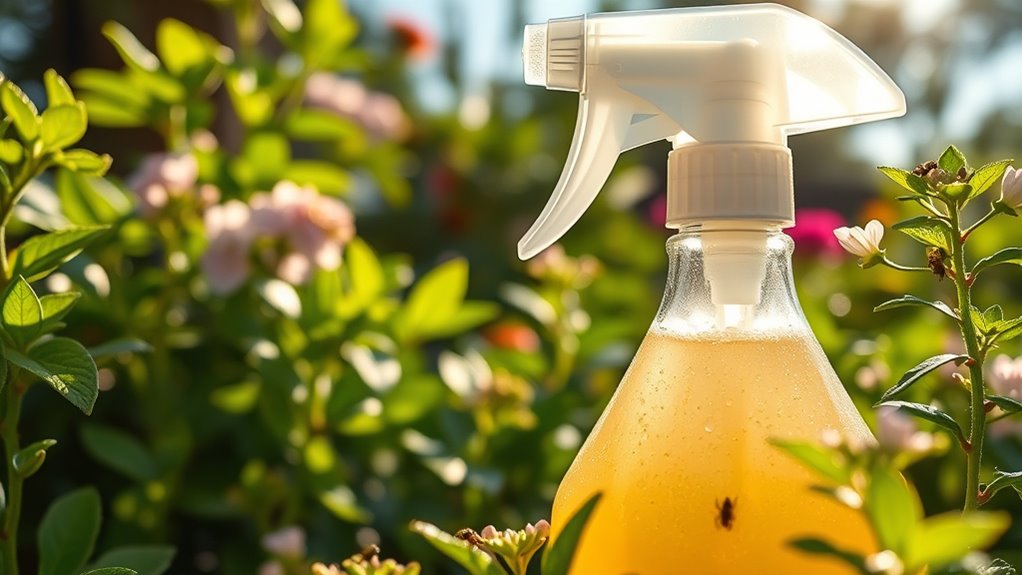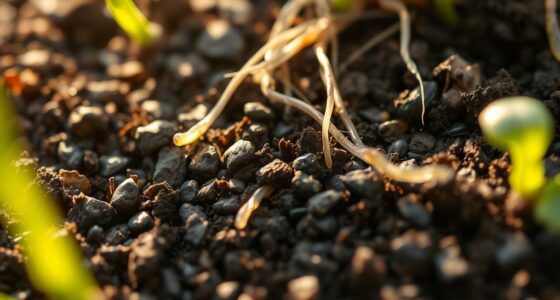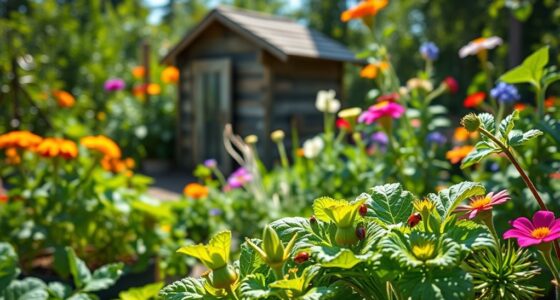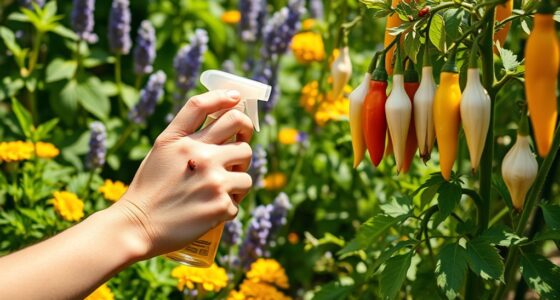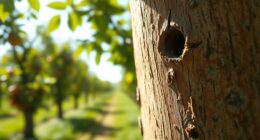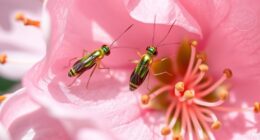To make an effective DIY natural insecticide, mix about one tablespoon of biodegradable, fragrance-free liquid soap with a gallon of water. Spray your plants early in the morning or late afternoon, making sure to cover all surfaces, especially the undersides of leaves. Reapply every few days or after rain to keep pests at bay. If you want to discover more tips for safe, eco-friendly pest control, keep exploring how soap sprays can help your garden thrive.
Key Takeaways
- Use biodegradable, fragrance-free liquid soap mixed with water (about one tablespoon per gallon) for a safe, DIY insecticide.
- Apply soap spray early morning or late afternoon, thoroughly covering all plant surfaces, especially undersides of leaves.
- Reapply every few days or after rain to maintain pest control; consistent use prevents infestations.
- Target soft-bodied pests like aphids, mites, and whiteflies; combine with beneficial insects and plant health practices.
- Avoid harsh dish or laundry soaps; choose gentle, plant-safe soaps like Castile or vegetable-based options for best results.
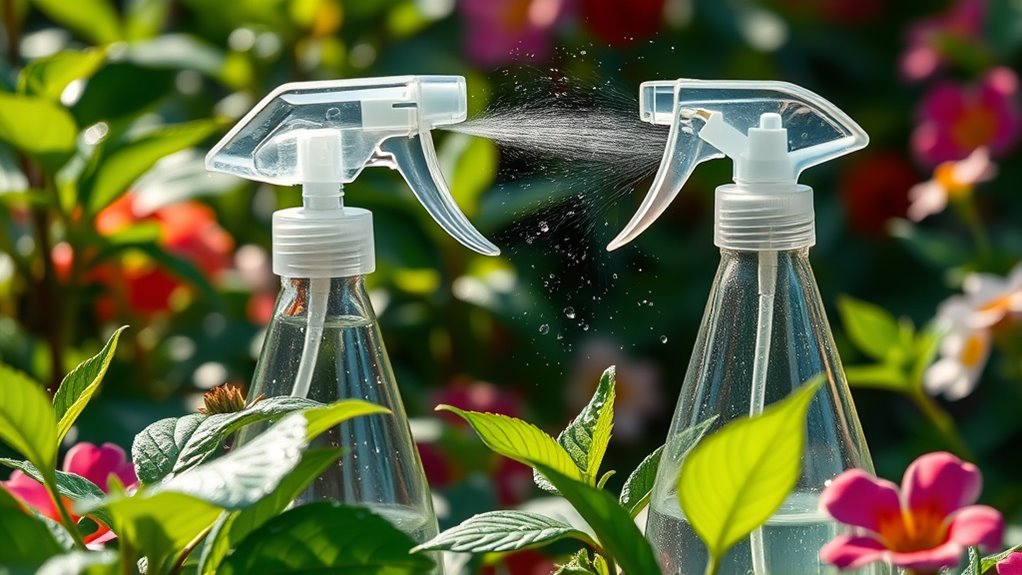
Are you tired of using chemical insecticides that harm your garden and the environment? If so, it’s time to explore natural alternatives like soap sprays. These DIY solutions are simple, effective, and align perfectly with organic gardening tips. They offer a safe way to manage pests without risking your plants’ health or polluting the soil and water sources nearby. Plus, soap sprays are affordable and easy to prepare at home, making them an excellent addition to your pest control strategies.
To get started, you’ll need a few basic ingredients: liquid soap (preferably biodegradable and free from added fragrances or dyes), water, and a spray bottle. The key is choosing the right soap—castile soap or pure vegetable-based soap works best because they’re gentle yet effective against soft-bodied insects like aphids, mites, and whiteflies. Avoid using laundry or dish soaps with harsh chemicals, as they can damage your plants’ leaves or disrupt the natural balance in your garden. Once you have your ingredients, you can mix a simple solution: about one tablespoon of soap per gallon of water. This ratio provides enough potency to target pests without harming your plants or beneficial insects.
Use biodegradable, fragrance-free soap and water—mix one tablespoon per gallon for a gentle, effective pest spray.
When applying your soap spray, do so early in the morning or late in the afternoon when the sun isn’t as intense. Spray thoroughly on affected plants, focusing on the undersides of leaves where pests often hide. Be sure to cover all surfaces, including stems and undersides, to maximize effectiveness. Reapply every few days or after heavy rain, which can wash away the solution. Consistency is key—regular applications help keep pest populations under control and prevent infestations from taking hold.
It’s important to remember that soap sprays are most effective as part of a broader pest control strategy. They work well against soft-bodied pests but may not eliminate tougher insects or larvae. Incorporating other organic gardening tips, such as encouraging beneficial insects like ladybugs or planting pest-repellent companion plants, enhances your overall pest management approach. Additionally, maintaining healthy plants through proper watering, fertilizing, and pruning reduces stress and makes your garden less inviting to pests. Understanding the contrast ratio of your spray and its ability to penetrate pests’ defenses can also improve efficacy, especially when targeting hidden or resilient pests.
Frequently Asked Questions
How Often Should I Apply Soap Sprays for Maximum Effectiveness?
For maximum effectiveness, you should carefully consider application frequency and spray timing. Usually, applying soap spray every 7 to 10 days works well, especially when pests are active. Make sure to spray early in the morning or late in the evening when temperatures are cooler. Keep an eye on your plants and pests, and adjust the frequency if needed to prevent damage or ineffective pest control.
Can Soap Sprays Harm Beneficial Insects in My Garden?
You might worry that soap sprays could wipe out all your beneficial insects, but they’re actually quite selective. With proper use, soap spray safety for beneficial insects is high, targeting pests without causing a garden-wide insect apocalypse. To keep your helpers safe, apply soap sprays during early morning or evening when beneficial insects are less active. This way, you protect your garden’s delicate balance while controlling pests effectively.
Are There Specific Plants That React Poorly to Soap Sprays?
Some plants are more sensitive to soap sprays due to plant sensitivity and soap residue buildup. You should be cautious with plants like roses, ferns, and certain herbs, which may develop leaf burn or discoloration if exposed to soap sprays too frequently or in high concentrations. Always test a small area first, and rinse off soap residue promptly to prevent damage, ensuring your plants stay healthy and vibrant.
What Are the Signs of Over-Application of Soap Sprays?
Think of your plants as delicate dancers; over-application of soap sprays can make them stumble. Signs of this include leaf tip burn, yellowing, or wilting, showing plant sensitivity to soap residue. If you notice these, it’s a clear sign you’ve gone too far. To avoid this, always monitor your plants and dilute soap sprays properly, respecting their boundaries to keep your garden healthy and thriving.
Can Soap Sprays Be Used Safely on Edible Vegetables?
Yes, you can use soap sprays safely on edible vegetables if you follow proper pesticide safety guidelines. Choose soap spray formulations specifically labeled for use on edibles and avoid concentrated or harsh options. Always apply in the early morning or late evening, and rinse vegetables thoroughly before harvest. This guarantees your plants stay healthy while minimizing any risk from soap residues, keeping your garden safe and organic.
Conclusion
Just as Pandora’s box held surprises within, your garden’s health lies in your hands. By mastering the art of soap sprays, you wield a simple yet powerful tool against pests, channeling nature’s own defenses. Remember, with patience and care, you can nurture a thriving, organic oasis—proof that even small actions echo the wisdom of ancient remedies. Embrace this DIY approach, and watch your garden flourish as if touched by the Midas touch.
